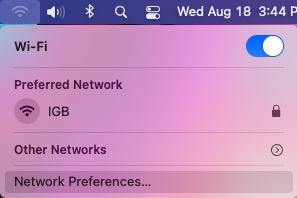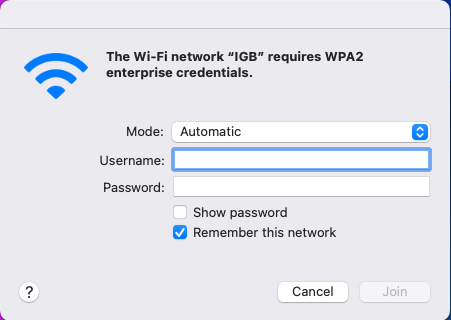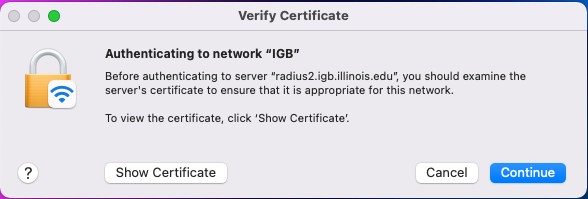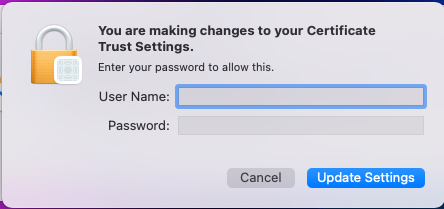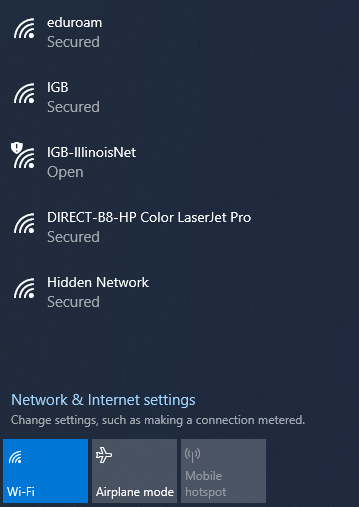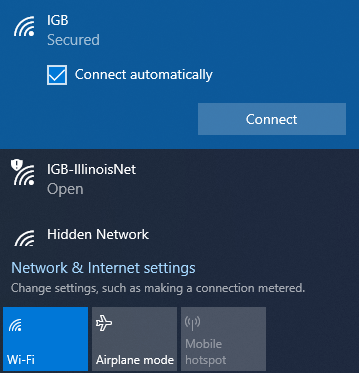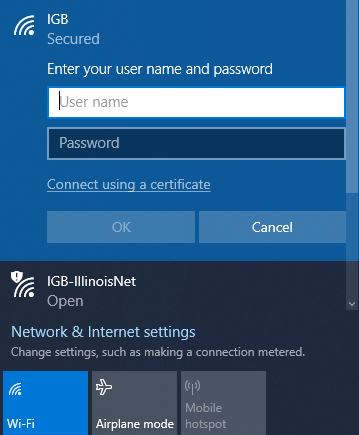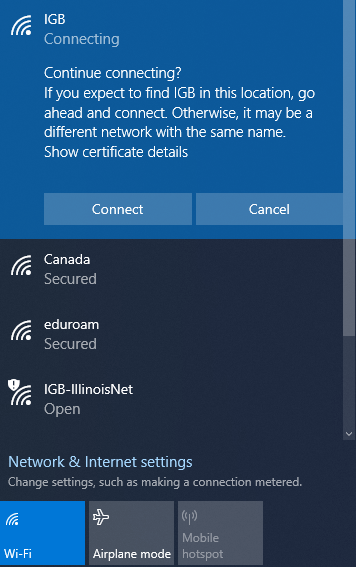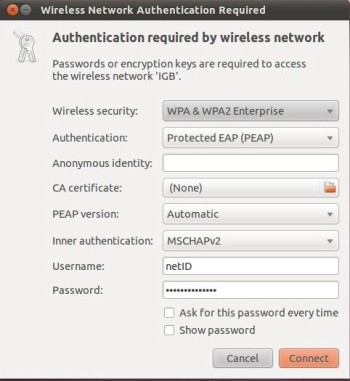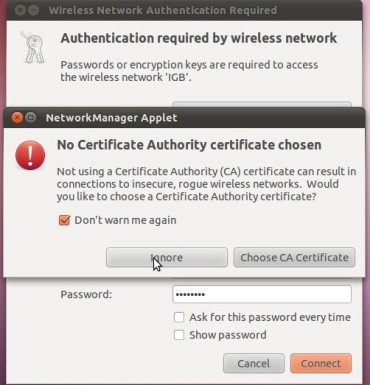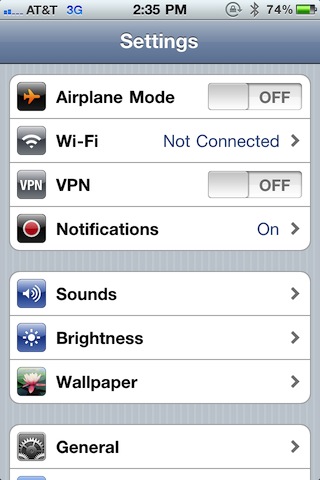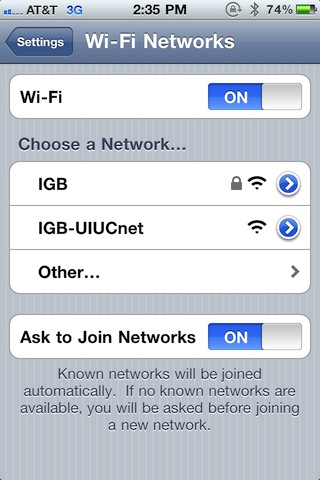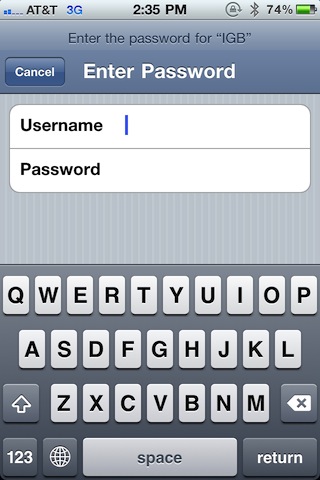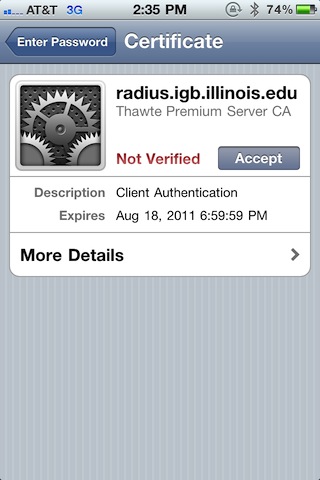Difference between revisions of "Wireless Internet"
Jump to navigation
Jump to search
(→Mac OS X) |
(→Windows 7/8/10) |
||
| Line 43: | Line 43: | ||
</div></div><div class="toccolours mw-collapsible mw-collapsed" style="width:900px"> | </div></div><div class="toccolours mw-collapsible mw-collapsed" style="width:900px"> | ||
| − | === Windows | + | === Windows 10 === |
<div class="mw-collapsible-content"> | <div class="mw-collapsible-content"> | ||
| − | + | *Click the wireless icon on the lower right part of the desktop | |
| − | *Click the wireless icon on the lower right part of the desktop | ||
| − | [[File: | + | [[File:Windows101wireless.png]] |
| − | * | + | *Select IGB and click connect |
| − | |||
| − | |||
| − | |||
| − | [[File: | + | [[File:Windows102wireless.png]] |
| − | * | + | *Enter your IGB username and password and click OK. |
| − | |||
| − | |||
| − | [[File: | + | [[File:Windows103wireless.png]] |
| − | *Click | + | *Click Connect to continue with logging in. |
| + | [[File:Windows104wireless.png]] | ||
| + | </div></div><div class="toccolours mw-collapsible mw-collapsed" style="width:900px"> | ||
| − | |||
| − | |||
| − | |||
| − | |||
| − | |||
| − | |||
=== Ubuntu/Linux === | === Ubuntu/Linux === | ||
<div class="mw-collapsible-content"> | <div class="mw-collapsible-content"> | ||
Revision as of 15:22, 20 August 2021
Contents
IGB Wireless Networks[edit]
- IGB - is the primary wireless connection at the IGB.
- IGB-IllinoisNet - if you do not have an IGB login, you may use your campus credentials to sign in with this network.
- Eduroam - is a wireless network found at educational institutions around the world. If you are visiting the University of Illinois at Urbana-Champaign, and you have an Eduroam account, you can use your Eduroam credentials to get connected here.
- If you are anywhere else on campus, please refer to this campus guide on getting set up - Campus Wireless Setup
IGB Wireless Settings[edit]
- Security Type - WPA2 Enterprise
- Encryption Type - AES
- Authentication/EAP Method - PEAP
- Inner Authentication/Authentication Method - MSCHAP V2
- Username: University NetID
- Password: IGB Password
- If required to put a domain - igb.illinois.edu
Mac OS X[edit]
- In OSX click on the wireless icon on the upper right corner of your screen by the clock.
- Select IGB from the list.
- A popup box will appear requesting your authentication information.
- Type in your IGB username and password to connect.
- Click continue when asked for the authentication
- Type in your computer username and password to authorize the changes
Windows 10[edit]
Ubuntu/Linux[edit]
- The following steps works successfully on Ubuntu 10.10. They should be similar on different version of Ubuntu, Fedora, or other Linux versions.
- When you attempt to connect to the IGB network, the box below should appear.
- Change Authentication to "Protected EAP (PEAP)"
- Type your netID in the Username field.
- Type your IGB password in the password field.
- Click "Connect".
- The following box will then appear
- Check "Don't warn me again".
- Click on "Ignore".
Android Phones/Tablets[edit]
- On your Android phone or table go to Settings->Wireless & networks->Wi-Fi settings
- Turn on Wi-Fi
- Select IGB from the list of Wi-Fi Networks
- A settings box should a appear with the list of settings. Make sure the following are all set.
- EAP method - PEAP
- Phase 2 authentication - None
- CA certificate - (unspecified) or select "Do not Validate"
- User certificate - (unspecified)
- Identity - Enter your netID
- Anonymous identity - Leave blank
- Password - IGB password
- Click Connect
Apple iPhones/iPads[edit]
- On your iOS device, click on "Settings" on your home screen
- On the settings screen, click on Wi-Fi
- Make sure that the Wi-Fi slider is set to "ON"
- Select IGB from the list of Wi-Fi Networks
- If you do not see IGB, make sure you are within IGB, and turn off and on the Wi-Fi.
- Click on IGB and enter your IGB username and password.
- Click "Accept" when it asks for Certificate Authentication.
- You should now be connected to our IGB wireless network.
